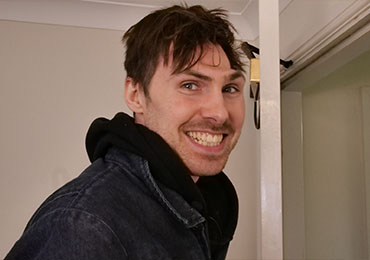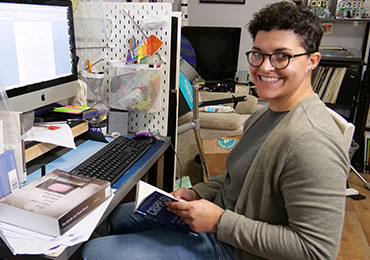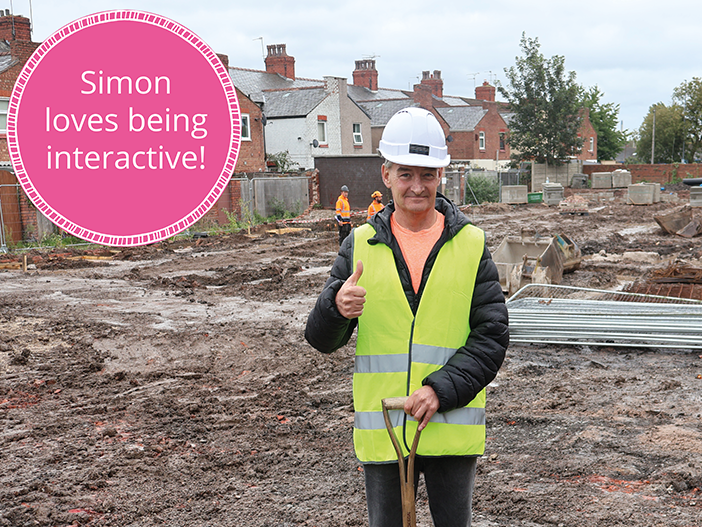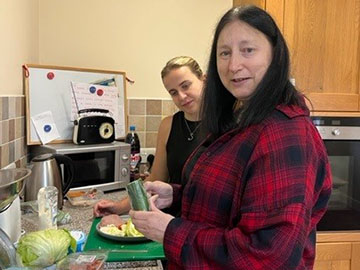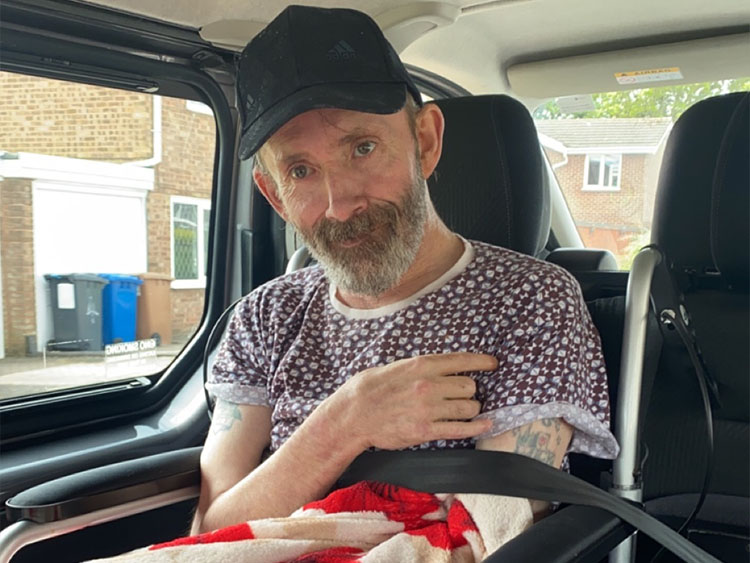James’ journey to independence after a brain injury
James’ beaming smile lights up every room at Theoc House, our specialist brain injury rehabilitation service in Gloucestershire. With his twinkling brown eyes and playful laugh, he’s now a picture of health and happiness. But for James, simply being able to smile is a miracle, working to regain his independence after a brain injury.
Two years ago, James suffered a traumatic brain injury that left him in critical condition in hospital. Just when his medical team were considering switching off his life support, James’ life force came flooding back and he moved his fingers.
Since that turning point, James has embarked upon a difficult rehabilitation journey, where he’s had to rediscover himself, rebuild his life, and come to terms with what happened to him on that fateful night only two years ago.
One fateful night
On a mild spring evening in April 2022, James and his long-term partner, Amelia, were enjoying a night out in their hometown, Cheltenham. Like any young couple in their twenties, they were having a fun-filled evening of socialising and making the most of the local nightlife.
Rounding off the night and making their way home, James found himself targeted in the town centre by another man.
After a heated exchange, James turned to walk away. Putting James’ fate in his hands, the other person unexpectedly punched him in the back of the head.
Hitting him with full force, James fell to the floor. As he crashed to the ground, the front of his skull smashed off the edge of a concrete pavement. With no remorse, James’ assaulter turned and walked away, unaware of the fate James was about to face.
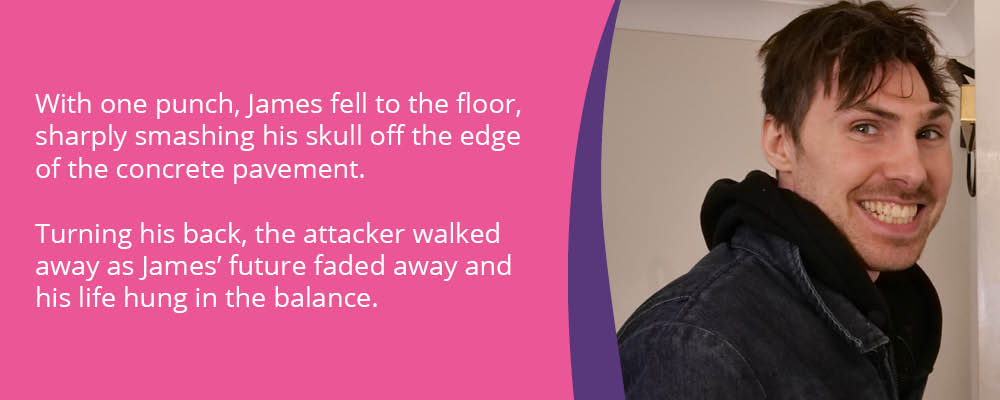
Critical consequences
Immediately rushed to hospital, James was in a critical condition. His injuries were extensive, and his life was danger. After many hours of surgery and life-saving procedures, James stabilised and was moved to intensive care.
Lapsing into a coma, he stayed in intensive care for many months with his devoted partner, Amelia, by his side.
Despite the doctors’ best efforts, James’ outlook was bleak. On several occasions, while in his coma, he almost lost his life. Even though he was saved every time, each episode had a damaging effect on his body and brain.
Many months later, James was showing no signs of regaining consciousness. Eventually, Amelia and James’ family found themselves engaged in a difficult conversation with James’ medical team. They were advised the kindest thing to do for James would be to turn off his life support machine. Even if he woke up, his injuries meant he would be severely disabled with a short life-expectancy.
Just as James’ family prepared to say goodbye, a miracle happened. James moved his fingers! Launching into action, Amelia bolted to the doctors’ office. After assessing James, they agreed he was showing enough sign of life to stay on life support. Hope was restored and James’ life was saved.
From that point on, James went from strength to strength. With the sound of his beloved girlfriend’s voice in his ears, and his supportive family cheering him on, James’ life force came flooding back.
But as he regained his spirit, it became obvious very quickly that he wasn’t quite the same person as he was before his attack.
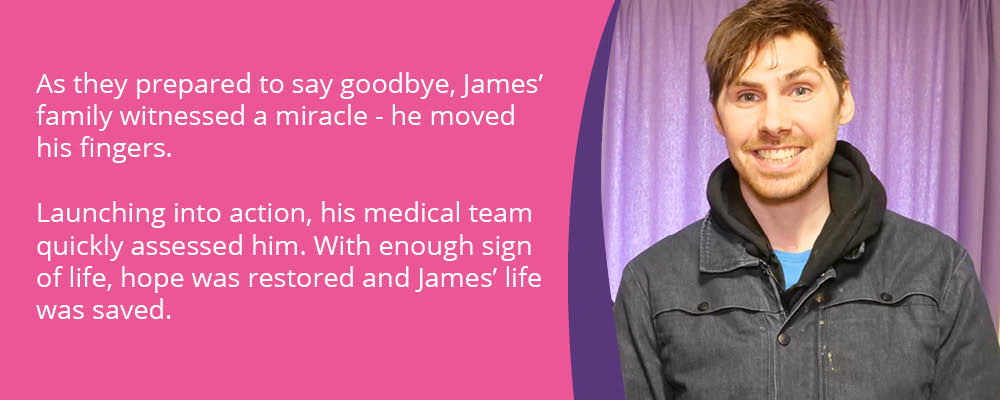
James’ early years
Growing up in the picturesque Gloucestershire countryside, James had an idyllic upbringing. Living with his parents on a sprawling estate situated in a serene spot, his life was relatively trouble free.
Eventually, his parents separated but James took this in his stride and continued pursuing his passions. As a teenager, he was a thrill seeker! Regularly riding his BMX on local rugged trails, he felt the need for speed. Eventually, he upgraded his mountain bike to a motorbike and enjoyed regularly riding out with his best friends.
James was a vibrant and positive person with a cheeky personality and mischievous sense of humour. He had a good group of friends, a meaningful relationship, his own home, and even a budding career as he started working at a local motorbike shop.
A happy-go-lucky guy, he was grateful for the good start his parents gave him and looked forward to his future.
One day, while James was on a motorbike ride with his best friend, he found himself at the centre of an unprecedented situation when his friend crashed his motorcycle.
Quickly rushing to his aid, James saw his friend, who was about to become a dad, was unresponsive.
James made no hesitation and called 999. An ambulance was despatched, but James desperately wanted to help his friend. He checked if his friend was breathing – but he wasn’t.
In an instant, James had lost his best friend. Then, in 2018, when James was the tender age of 24, tragedy struck again a when his mum was diagnosed with breast cancer.
Suffering from a short-lived illness, her passing deeply affected James. Drawing on his positive mindset – which he attributed to his mum – he rallied and vowed to push forward with life and make the most of every opportunity.
James had experienced significant loss. As a naturally positive person, he used his grief to look forward to the future and live a fulfilled life. Even after he suffered his brain injury, James remained focused and pushed forward with fearless determination.
Journey to Theoc
Once James awoke from his coma, he was transferred to a brain injury rehabilitation unit in Bristol. Here, he received acute support for his condition. As days went by, James’ rehabilitation potential was assessed and his options for the future determined.
Although James’ progress was promising, he had a long journey ahead of him – and the road to recovery wasn’t going to be a smooth ride.
James wouldn’t receive long-term support at the rehabilitation unit, so his partner, Amelia, set to work sourcing additional specialist support for him.
Scouring the internet, Amelia came across Voyage Care. As if by fate, she discovered Theoc House – our residential brain injury support service located close to where both she and James’ family lived.
Dropping by the service with her mum for support, Amelia instantly knew this was the right environment for James to thrive. Setting the wheels in motion with their local authority, Amelia secured a place at Theoc House for James.
Within just two weeks, James moved in. Although he had achieved a lot at the rehabilitation unit, he still had many needs and required additional support in most areas of his life.
Promoting independence after a brain injury
Unable to walk, James used a wheelchair when he first arrived at Theoc House. With impaired mobility, he needed support with tasks such as personal care.
James also had difficulties swallowing and relied on a PEG feeding tube. With thanks to their specialist training, Eve, Service Manager, and the team at Theoc House were able to manage all of James’ physical care needs.
As well as managing his mobility and personal care needs, they also received specialist training from our Clinical Nurse Manager, so they could support James to manage his PEG and ensure he received adequate nutrition.
Working closely with our dedicated Therapy Lead, Rhiannon, James was able to transition away from his PEG. Rhiannon engaged him with a Speech and Language Therapist (SALT) to work on his swallowing. Outside of their scheduled sessions, Rhiannon drew upon her specialist therapy training to support James to continue his SALT exercises in functional, everyday scenarios.
Once James was able to free himself from his feeding tube, his confidence came pouring back. Motivated to keep achieving more, James was driven to reach a bigger goal.
Stepping forward
Before his incident, James was fiercely independent. He was highly driven and passionate about his hobbies and interests. Losing the ability to participate in meaningful activities took its toll on James, especially since he was unable to walk.
By getting to know James as a person, his team at Theoc House recognised just how important independence was to him. They collaborated with James to design a person-centred support plan that would meet his rehabilitation needs and help him reach his goals.
Through this approach, they identified that being able to walk and living independently was what James wanted. Seeing how determined and motivated he was, they set work!
James worked closely with his Therapy Lead, Rhiannon, in between physiotherapy sessions. Phasing the approach, Rhiannon encouraged James to take his goal of walking in stages.
Within just a few months, with the support and compassion of Rhiannon, James went from relying on his wheelchair to walking on his own!
Occasionally, James experienced setbacks and had days when he felt down about his condition. He was keen to make quick progress and put a lot of pressure on himself. Using specialist support, the team at Theoc House supported him through these moments. They understood what motivated James and used this to keep him on track with his progress.
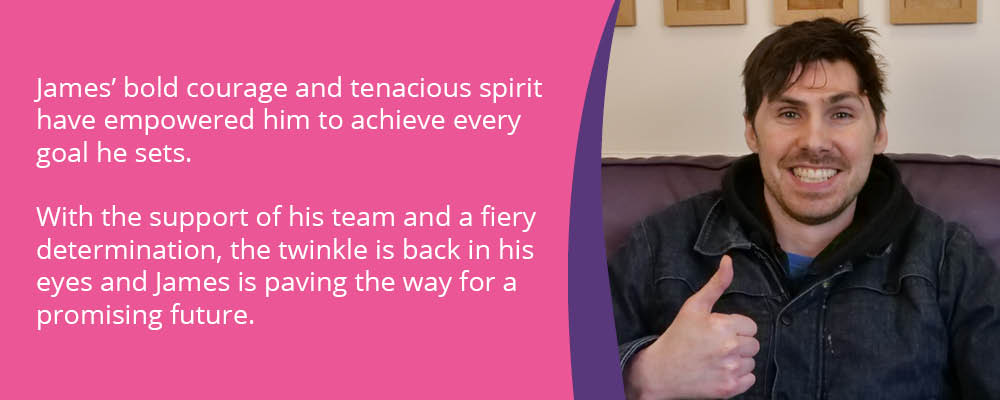
Mental health matters
Understandably, James’ incident had a massive impact on his mental health. In the months after he woke up from his coma, his memory was compromised, and he struggled with insight into what happened and the condition it left him with.
As he regained his insight, James struggled to accept what had happened to him. He desperately craved the life he had before he was assaulted and became withdrawn and disengaged.
The team at Theoc House are specially trained to support the mental health needs of people with brain injuries and were able to support James through this difficult time.
When James was showing signs of depression, they quickly sought support from both his GP and Cognitive Behavioural Therapist (CBT). James was prescribed medication by his doctor and his CBT sessions were tailored to meet his evolving mental health needs.
With this vital support in place, and his support team encouraging him to talk about his feelings, James overcame the mountain he felt had been placed in front of him.
With all his might, he made positive steps forward and began smashing all his goals again!
Embracing independence after a brain injury
James was the victim of another person’s rash actions, which almost took his life. Thanks to CCTV surveillance equipment, the police were able to track down his attacker and seek the justice James deserved.
Although James still experiences a great deal of anxiety around his assault, he’s determined to move forward with his life and make the most of his future. Since moving to Theoc House, he’s progressed from needing support in every area of his life to now doing most things for himself.
With bold courage and a brave spirit, James has overcome adversity and worked with his expert team to spring forward on his journey to independence after brain injury. And now he’s ready to transition to independent accommodation, there’s no holding him back!
James is accomplishing every goal he sets and faces up to his challenges. With his fiery determination, and the twinkle back in his eyes, James is paving the way for a promising future.
Find out more
To find out more about our specialist brain injury support and how we can help you, a loved one, or a client, fill out our simple enquiry form and a member of our team will be in touch.

 Brain injury rehab
Brain injury rehab  More success stories
More success stories 